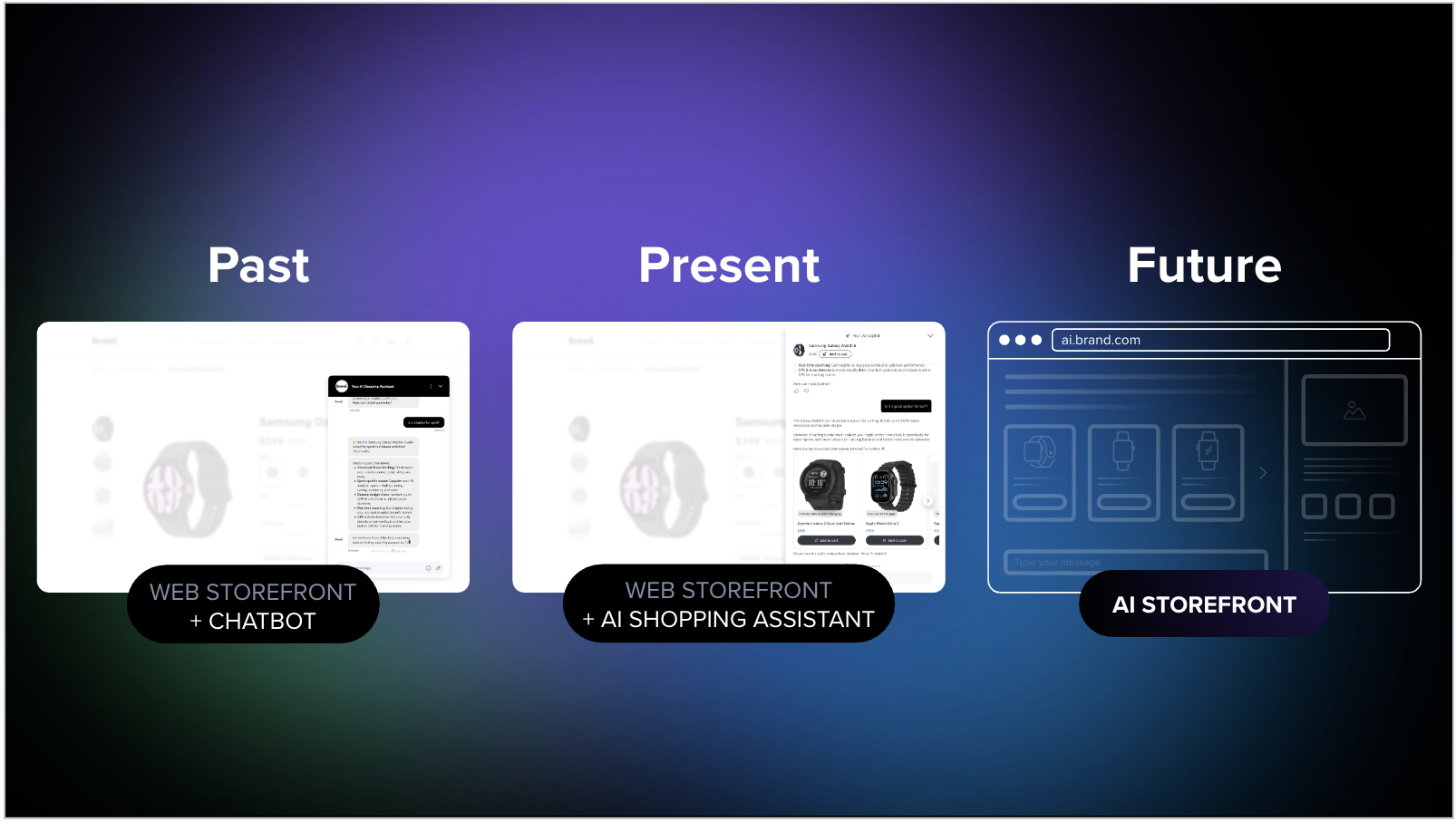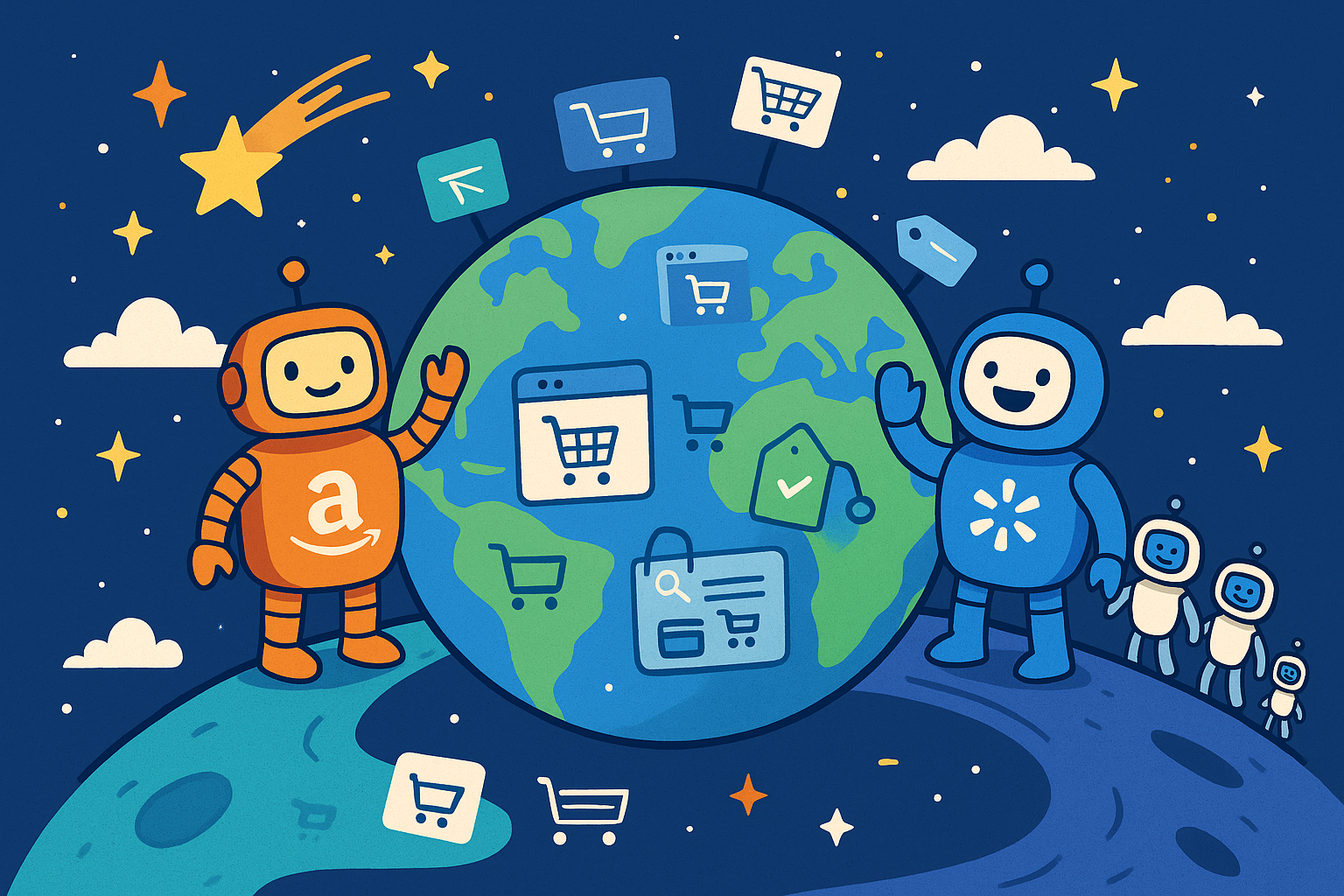How the New Generation of Chatbots for Business Are Changing Online Sales
iAdvize

Many consumers are already familiar with artificial intelligence; the first AI-inspired program was written as far back as 1951. However, it took decades to turn these tentative concepts into tangible realities. The good news is that times are changing, and modern AI solutions are now equipped with advanced features that extend far beyond those of ChatGPT or Google Bard. These tools are transforming the e-commerce buyer journey, and businesses are only just beginning to reap the benefits of chatbots.
An Introduction to the New Generation of Chatbots for Business
What do next-gen bots look like?
Let's start with a basic overview of generative AI. IBM defines it as a type of artificial intelligence capable of creating, or generating, specific types of output based on the information that they were programmed to interpret. Audio, text, and images all fall into this category.
In other words, the material that’s produced is determined by the prompts that a user enters, as well as what the system has been engineered to interpret. Chatbots built for use in business rely on these very same methods, providing detailed answers to industry-specific questions based on prompts. Having said this, newer models are much more advanced than their predecessors.
Older versions used what was known as rule-based technology. In other words, they couldn’t make decisions on their own, and questions beyond the scope of their programming were limited and often incorrect. The good news is that this tech has come a long way since then.
Modern chatbots that are customer facing for business purposes now heavily rely on a combination of generative AI and natural language understanding (NLU). These are both capable of providing much more accurate and personalized answers to a wide variety of customer requests.
In many cases, users might not even be able to determine whether they are interacting with a person or a machine.
The rise of chatbots in business
Thanks to the rise of neural networks, natural language processing (NLP), and deep learning, e-commerce website users can expect better experiences with the bots they find on product pages than before. Their advanced capabilities also allow for a wider range of applications that were impossible not long ago.
Chatbots are no longer limited to answering a handful of predetermined inquiries, serving as nothing more than a guide to frequently asked questions (FAQs), or automating routine tasks. They can now do things like facilitate the onboarding process, confirm a sale, provide customers with extremely targeted product recommendations, and act as intermediaries between clients and company representatives.
Benefits of AI-Powered Bots for Online Shopping
Personalized shopping experiences
One of the greatest benefits of leveraging modern chatbots in the e-commerce customer journey is their ability to provide a customized end-user experience. These tools are no longer limited to a series of decidedly shallow (and sometimes clumsy) responses. Instead, they can have conversations and give answers on par with human customer service agents, dramatically enhancing the buyer experience.
24/7 availability
From a practical perspective, chatbots are capable of responding immediately in a way that humans often aren't, so customers don't have to wait until business hours to receive a response.
This always-on availability is useful for organizations that address a wide audience base—like clients who live in different geographic regions, retailers that have a large catalog of products that customers need support to sift through, or small businesses that have a limited support team.
Increased conversion rates
McKinsey found that 80% of all retail customers rank personalization as one of the most important factors when purchasing a product.
Individuals who feel that their needs are being catered to will be more likely to convert from website visitors into loyal customers. To meet this need, it's imperative that brands incorporate modern chatbots into the customer journey.
Enhanced customer service and support
Customer relationship management (CRM) solutions have come a long way over the years. With so many options available, the average consumer is no longer satisfied with generic service experiences. They can simply look elsewhere within the vast e-commerce domain if their needs aren't met instantly.
Chatbots for businesses can provide customer support as a standalone, or supplemented by human agents or on-demand brand advocates, offering the best of both worlds. Furthermore, many of these cutting-edge software solutions offer an improved customer experience, while minimizing concerns associated with data compliance and digital security.
How New Chatbots Are Transforming Online Sales
Now that we've covered some of the reasons most businesses have improved their outlook on chatbots, we should highlight their unique role within the larger customer journey.
Automating customer interactions
We now live in a world defined by speed and efficiency—or at least, this is what online shopping statistics tell us consumers expect from their interactions with e-commerce companies. Chatbots are another way businesses can obtain a competitive edge by automating low-impact customer interactions, like frequently asked questions (FAQs).
This type of communication channel is particularly useful for shoppers on the go, who rely on their phones for everyday tasks.
From the ability to address common product-related questions to providing recommendations based on past buying patterns, chatbots offer customers an intelligent assistant and brands a leg up.
Streamlining the Sales Process
Sales pipelines can be notoriously difficult to manage, particularly when referring to conversions. Chatbots are capable of providing product descriptions, and acting as liaisons between the customer and the business.
Furthermore, customers who are confident that their needs are being addressed in a personalized way are much more likely to remain on the path to purchase until a sale is complete.
Facilitating Seamless Transactions
Chatbots can also be extremely useful tools when used as an addition to more traditional point of sale (POS) systems. After all, the last thing that a business wants is to lose a prospective customer due to a clumsy checkout process.
AI bots can provide assistance when needed, and if necessary, direct the user to a human representative.
How to Successfully Use Chatbots in Business
Because it helps to have real-world examples of conversational chatbots, let's cover some of the different ways that generative AI-powered chatbots are utilized by businesses.
E-commerce
For an online business, there are many advantages of chatbots that include automating tasks like quickly addressing common questions and FAQs, tracking down order information, and offering personalized product recommendations in response to the needs of each unique customer.
Customer service
Research shows that a staggering 90% of Americans prefer to interact with a brand that offers online chat and messaging as standard services.
So, it's reasonable to assume that these same consumers expect any issues to be resolved in a timely manner. Chatbots can be used to troubleshoot problems before they escalate into deal-breaking scenarios. When issues can’t be solved by the bot, it will transfer the conversation to a human customer service agent to continue the interaction.
Marketing and sales
Chatbots can generate leads, keep website visitors engaged for longer periods of time, and provide personalized sales support. Not only are these solutions excellent tools for boosting e-commerce conversion rates, but they also provide a more seamless user experience (UX) that increases brand recognition.
How to Implement a New-Era Chatbot for Business
Choosing the right chatbot platform
It's important to note that not all chatbots are meant to be used for the same purpose. For example, some companies may be primarily concerned with the ability to handle a large amount of customer inquiries at any given time.
Eyewear retailer, Payne Glasses, is one example. They decided to implement an AI copilot into their existing online customer service operations for the purpose of reducing their ticket volume in a cost-effective manner.
The results of this implementation was 24/7 customer service coverage, and ultimately, a 10x increase in conversion rate.
The main point is that any AI customer solution you decide to use should be scalable and shaped around the needs of your business.
Integration with existing systems
Network integration is another key concern. Flexible chatbots should be capable of seamlessly working with existing in-house CRM and enterprise resource planning (ERP) systems.
And this level of flexibility should pass on to the customer. Ideally, the bot would be able to create an effective digital customer experience that streamlines the buyer journey for every shopper.
Monitoring and optimization
When launching a new chatbot, brands should take several factors into account. These include analyzing case studies relevant to the brand's business model, identifying key goals, and ensuring that customer privacy is paramount.
Quality generative AI chatbots should offer a proactive means of monitoring their performance, so that they can be continually optimized. This will enable their role to evolve in alignment with changing business conditions.
The Impact of AI-Powered Chatbots on Online Sales
We now understand why we're seeing a rapid adoption of chatbots powered by generative AI software within the e-commerce industry.
Offering an amalgam of personalized customer support, the ability to automate existing CRM solutions, and streamlining the conversion process, there’s little doubt that these powerful solutions will become commonplace in the near future.

.png)
.png)








